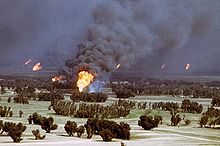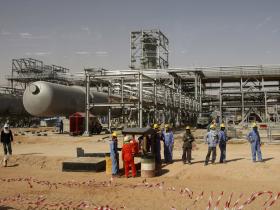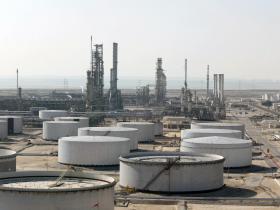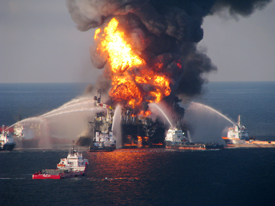


Saudi Arabia sets out sweeping
reforms to wean itself off 'dangerous addiction' to oil by 2020
Prince Mohammed bin
Salman said that reforms will involve selling shares in
the state-owned oil giant Aramco and allowing women more
of a role.
Prince Mohammed bin
Salman said that Riyadh, the capital of Saudi Arabia,
needed to cut its dependence on crude oil revenue.
 "We
have an addiction to oil. This is dangerous. It has
delayed the development of other sectors," Prince Mohammed
said in a televised interview with al-Arabiya news
channel, which is owned by the Al Saud ruling family.
"We
have an addiction to oil. This is dangerous. It has
delayed the development of other sectors," Prince Mohammed
said in a televised interview with al-Arabiya news
channel, which is owned by the Al Saud ruling family.
He added that Riyadh, the capital of Saudi Arabia, needed
to cut its dependence on crude oil revenue.
6 real reasons why Saudi Arabia agreed to freeze oil
production
Deputy Crown Prince Mohammed bin Salman, who oversees the
economy in the kingdom, said that the reforms will involve
selling shares in the state-owned oil giant Aramco and
allowing women more of a role in building the economy.
Long-term arab and Muslim immigrants known as resident
expatriates are also to be offered better opportunities to
stay and work in the kingdom. The expat 'green card', as
the scheme has been dubbed, will give residents from
oversees more rights to improve the investment climate in
the kingdom.
The plans centre on a Public Investment Fund, boosted by
money from selling shares in Aramco, that will be used to
invest in companies and other projects abroad.
 Saudi
Arabia said it would raise the capital of the fund from
600 billion riyals ($160 billion) to 7 trillion riyals ($2
trillion).
Saudi
Arabia said it would raise the capital of the fund from
600 billion riyals ($160 billion) to 7 trillion riyals ($2
trillion).
"We restructured the fund. We included new assets in the
fund, Aramco and other assets, and we fixed the problems
of the current assets that the public investment fund
owns, both in terms of companies and other projects,"
Prince Mohammed said.
All financial information relating to Aramco will be
disclosed, ushering in an unprecedented level of
transparency.
Prince Mohammed said that Aramco's rights to Saudi
Arabia's crude oil reserves would see it transformed into
an energy company valued more than �2 trillion. A public
offering selling just 1 per cent of its value would create
the biggest initial public offering (IPO) in the world, he
added.
Prince Mohammed said the plans include increasing the
private sector share in the economy from 40 per cent to 60
per cent, reducing unemployment from 11 per cent to 7.6
per cent and growing non-oil income.
The Vision 2030 plan has been welcomed by analysts who
have long said that Saudi Arabia's over-reliance on oil
was not sustainable. Some said they would be keeping a
close eye on the details as the changes are implemented.
Saudi Arabia is looking for $6-8 billion in bank loans
"Details are still scarce, but the ambition is evident and
the government appears confident in embracing technology
and cultural development in the execution of its plans,"
said Mohieddine Kronfol, chief investment officer for
Global Sukuk and Middle East fixed income at Franklin
Templeton Investments.
Ahmed Al-Jundi, executive at Jeddah-based architectural
firm Diyar Consultants, said it was a huge step in the
right direction.
"As a Saudi I am optimistic, as a businessman I am
encouraged, but we have to see how the government plans on
pushing through with those plans in a way that is mutually
beneficial to the private sector, so that we can continue
absorbing more employees from the public sector," he said.
The kingdom's latest plans come after Saudi Arabia's
announcement last month that it would seek $6 to $8
billion in loans from international lenders alongside
cutting public spending and local subsidies to try and
close the $100 billion deficit that opened up in its
finances in 2015.
Saudi Arabia has already raised domestic petrol prices by
up to 40 per cent and set about dismantling generous
subsidies for water, electricity and petrol. The kingdom
has traditionally kept prices low for residents as a
social welfare measure.
�I think by 2020, if oil stops we can survive,� Prince
Mohammed said. �We need it, we need it, but I think in
2020 we can live without oil.�
Elon Musk's
Unbelievably Simple 12-minute Killer Break Down on Climate Change
Shell's Gulf of Mexico Oil Spill:

Fire boats battle blazing remnants of the Deepwater
Horizon rig the day after it exploded


Who Is Funding
the Dakota Access Pipeline? Video



 "We
have an addiction to oil. This is dangerous. It has
delayed the development of other sectors," Prince Mohammed
said in a televised interview with al-Arabiya news
channel, which is owned by the Al Saud ruling family.
"We
have an addiction to oil. This is dangerous. It has
delayed the development of other sectors," Prince Mohammed
said in a televised interview with al-Arabiya news
channel, which is owned by the Al Saud ruling family. Saudi
Arabia said it would raise the capital of the fund from
600 billion riyals ($160 billion) to 7 trillion riyals ($2
trillion).
Saudi
Arabia said it would raise the capital of the fund from
600 billion riyals ($160 billion) to 7 trillion riyals ($2
trillion).

